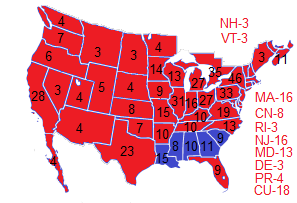| ‹ 1944 | ||||
| United States Presidential election, 1948 | ||||
|---|---|---|---|---|
| November 2, 1948 | ||||

|

|
|||
| Candidate | Prescott Bush | James F. Byrnes | ||
| Party | National | Democratic | ||
| Running mate | Thomas E. Dewey | Ronald Bisterle | ||
| Electoral vote | 555 | 53 | ||
| Percentage | 57.1% | 42.2% | ||

| ||||
| Red indicates Bush/Dewey, Blue indicates Byrnes/Bisterle | ||||
The United States Presidential election of 1948 was held on November 2, 1948. Benefitting from a strong economic climate and a weak and divided opposition, incumbent Nationalist President Prescott Bush of Connecticut cruised to a landslide reelection victory, earning 555 electoral votes and winning 57.1% of the popular vote. His opponent, Democrat James Byrnes of South Carolina, was regarded as a moderate on economic issues but a conservative on racial issues, and Bush's 93% tally of the black vote was largely attributed to a conservative Southerner appearing atop the Democratic ticket for the first time since 1928. Byrnes, while regarded a strong candidate, was plagued both by the incumbent's popularity and infighting between the liberal and conservative wings of the Democratic Party.
Nominations[]
General Election[]
Campaign[]
Results[]
The stunning Bush landslide came as a surprise, even to many of his campaign staff. While confident of a win, they were surprised by the success of his campaign surrogates in many Southern states, where his support of civil rights was expected to hurt him. However, in states such as Virginia, North Carolina and Florida, where voting restrictions on minorities were less severe, he won by narrow margins, becoming the first Nationalist candidate to win North Carolina since 1848, a century earlier. An even larger surprise was Cuba, a state that no Nationalist had ever carried in a general election, which Bush won by 8.6%, ending over a century of Democratic control in the rapidly-growing state. Other shocking inroads of the Nationalist ticket included states such as Tennessee, Kentucky and Texas, all states where Nationalists had traditionally suffered problems and all tickets that had voted Democratic in 1936, 1940 and 1944. Byrnes, who won only 53 electoral votes, stated that he personally was stunned that Bush had managed such impressive margins in the traditionally Democratic Solid South, openly debating whether or not he was in the wrong party after the election.
